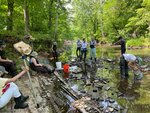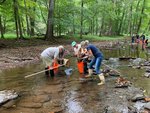

Hopewell, N.J.: The Sourland Mountain is known for its pristine headwaters that flow from the mountain to the Raritan, Millstone, and Delaware rivers. Millions of people rely on those rivers to provide clean, safe drinking water.
If a stream is healthy, it’s teaming with life: plants, insects, fish, amphibians, birds, and other animals. In fact, the creatures found in or near a stream can actually provide invaluable information to scientists. Birds like the Louisiana Water Thrush, for instance, will only be found in the cleanest streams.
Macroinvertebrates (spineless organisms that are large enough to be seen with the naked eye) are very reliable indicators of water quality. In fact, macroinvertebrate surveys can be much less expensive and even more reliable than chemical tests as they can offer a detailed picture of overall ecosystem health. Some aquatic creatures are more sensitive to pollution, will tolerate warmer water, suspended solids, etc.
Monitoring the presence and diversity of the types of macroinvertebrates over time can offer biologists insights into the effects of changes in the stream and landscape such as ash tree mortality and climate change. In the spring, the Sourland Conservancy works with NJ Watershed Ambassadors to conduct a “spring taster” for stream monitoring 7 to 8 p.m. Thursday, May 5, and Saturday, May 7. The two-part workshop that includes a classroom component and hands-on experience.
The first session covers what could affect stream health and how we access stream health. This primer is important because it explains broad concepts to participants and gets them ready to make assessments. In the second session, participants are invited to come outdoors and conduct a hands-on stream assessment where they will be asked to collect data on various assessment points such as stream width, depth and water velocity.
Taking a step further, the Sourland Conservancy will partner with The Watershed Institute and NJDEP to send volunteers to Stream School to become Sourland Stream Stewards. Stream School is a multi-day training and certification process that will certify Sourland Stream Stewards to collect and submit their data to the Water Quality Exchange Network (WQX), which allows this data to be seen and used by the EPA. This is exciting because it is one of the first New Jersey nonprofit programs that will be certified to input data into the WQX. The Sourland Conservancy will also partner with Raritan Valley Community College (RVCC) professor Dr. Emilie Stander and her students in 2022. Dr. Stander and students will participate in both biological and habitat assessments of Sourland streams as well as collect water samples for nutrient and bacterial analysis at RVCC’s Water Quality Laboratory.
Dr. Stander’s student water quality interns will assist in training students in sample collection and laboratory analysis procedures for data quality and assurance purposes. This partnership will further help us understand the health of Sourland streams and the water quality issues we are facing.
This project is important because we all live upstream. By understanding water quality in the Sourlands, we can help ensure safe and clean drinking water for communities and ecosystems that live downstream of this region.
Learn more by visiting sourland.org/stream-monitoring.
Join our readers whose generous donations are making it possible for you to read our news coverage. Help keep local journalism alive and our community strong. Donate today.